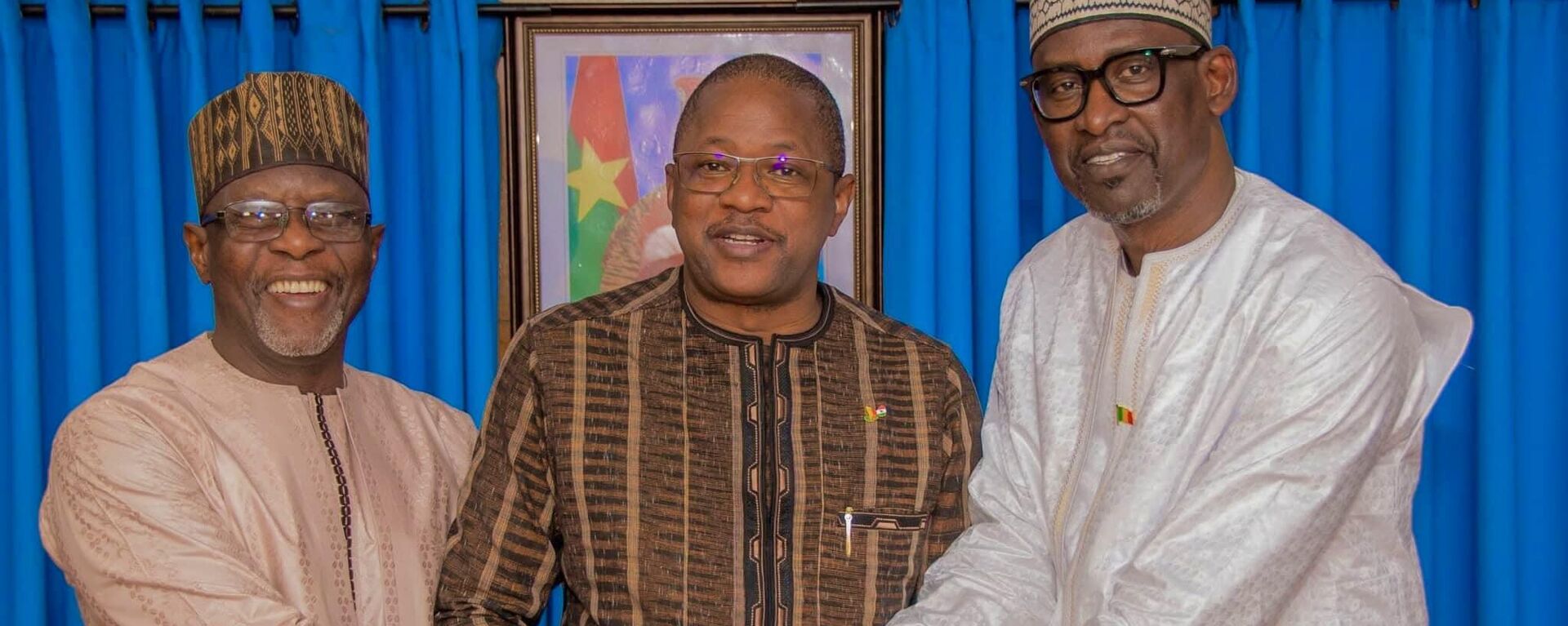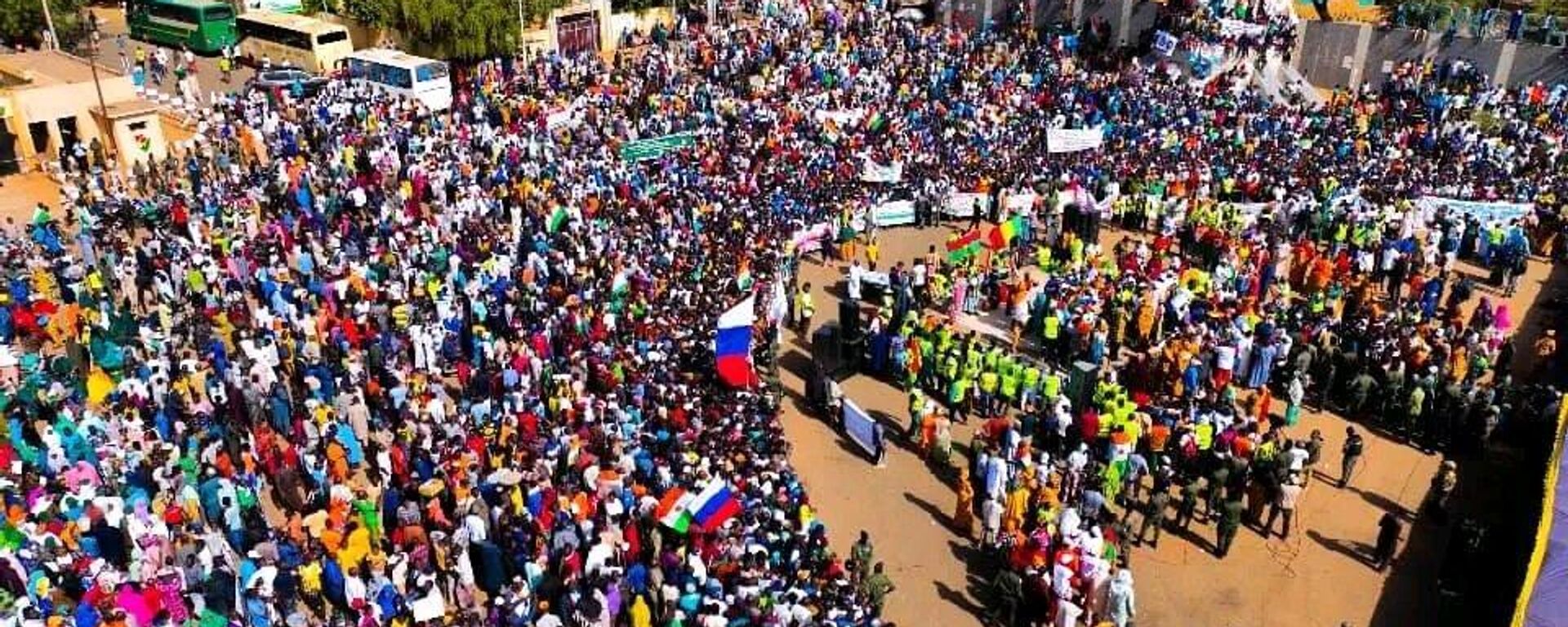https://en.sputniknews.africa/20250129/ecowas-wants-to-continue-security-cooperation-with-countries-of-sahel-says-commissioner-1070405536.html
ECOWAS Wants to Continue Security Cooperation With Countries of Sahel, Says Commissioner
ECOWAS Wants to Continue Security Cooperation With Countries of Sahel, Says Commissioner
Sputnik Africa
On Wednesday, ECOWAS adopted a declaration allowing citizens of the Sahel countries, namely Mali, Burkina Faso and Niger, with passports bearing the... 29.01.2025, Sputnik Africa
2025-01-29T13:15+0100
2025-01-29T13:15+0100
2025-01-29T15:42+0100
alliance of sahel states (aes)
west
niger
mali
economic community of west african states (ecowas)
burkina faso
west africa
terrorism
fighting terrorism
opinion
https://cdn1.img.sputniknews.africa/img/07e9/01/1d/1070406203_0:74:1489:912_1920x0_80_0_0_387ae6b54ce08afc7f85b52ebd20e117.jpg
The Economic Community of West African States (ECOWAS) intends to continue cooperating with Niger, Mali and Burkina Faso which form the Alliance of Sahel States (AES), on humanitarian and security issues, including fighting terrorism, ECOWAS Commissioner for Political Affairs, Peace and Security Abdel Fatau Musah has told Sputnik. The commissioner specified that the threat of terrorism looms over the entire West African region, but so far none of the AES have agreed to cooperate to resolve this problem. Despite the lack of a positive response on this issue, Musah noted that sooner or later the parties will sit down at the negotiating table to resolve this issue.Moreover, ECOWAS will be forced to withdraw a number of structures from Mali, Burkina Faso and Niger after their withdrawal from the community, which will lead to disruption of the work of some of the organization's institutions, the regional bloc's official said.He went on to say that if the AES countries withdraw, the institution's relocation to other member states "is going to have an impact."The commissioner clarified that while the action plan has not yet been adopted, ECOWAS is already creating a commission whose purpose will be to hold talks with representatives of the three countries that left the organization and decide what to do with the assets and structures.Musah stated that the withdrawal of Mali, Burkina Faso and Niger will have a huge psychological impact on residents of the entire region.Burkina Faso, Mali and Niger will have to conclude new agreements to maintain trade relations after leaving the bloc, the official stressed.Furthermore, the commissioner noted that the withdrawal of Mali, Burkina Faso and Niger from ECOWAS would affect many who had traveled and maintained economic and social ties with the countries of the organization.The Wednesday declaration also noted that trade would be carried out according to the rules adopted in the ECOWAS trade liberalization scheme until further action is determined.The Economic Community of West African States gave Sahel countries six months to reconsider their decision to leave the group on December 15. In January 2024, Burkina Faso, Niger, and Mali announced their withdrawal from the ECOWAS regional bloc. According to the AES officials, the community has become a threat to member countries. According to a joint statement by Burkina Faso, Niger, and Mali, the regional bloc has imposed "illegal, illegitimate, inhumane, and irresponsible sanctions" against the three countries. ECOWAS said it was committed to finding a negotiated solution. In July 2024, in Niamey, the presidents of Mali, Niger, and Burkina Faso signed a charter establishing the Sahel Alliance, which provides for the coordination of diplomatic work, foreign policy, economic relations, and security cooperation.
https://en.sputniknews.africa/20250129/aes-has-chance-to-supplant-ecowas-as-burkina-faso-niger-and-mali-pull-out-political-analyst-says-1070406807.html
https://en.sputniknews.africa/20250128/aes-states-celebrate-first-anniversary-of-ecowas-withdrawal-1070392931.html
west
niger
mali
burkina faso
west africa
Sputnik Africa
feedback@sputniknews.com
+74956456601
MIA „Rossiya Segodnya“
2025
News
en_EN
Sputnik Africa
feedback@sputniknews.com
+74956456601
MIA „Rossiya Segodnya“
Sputnik Africa
feedback@sputniknews.com
+74956456601
MIA „Rossiya Segodnya“
alliance of sahel states (aes), west, niger, mali, economic community of west african states (ecowas), burkina faso, west africa, terrorism, fighting terrorism, africa in details
alliance of sahel states (aes), west, niger, mali, economic community of west african states (ecowas), burkina faso, west africa, terrorism, fighting terrorism, africa in details
ECOWAS Wants to Continue Security Cooperation With Countries of Sahel, Says Commissioner
13:15 29.01.2025 (Updated: 15:42 29.01.2025) Kirill Kurevlev
Managing Editor
On Wednesday, ECOWAS adopted a declaration allowing citizens of the Sahel countries, namely Mali, Burkina Faso and Niger, with passports bearing the organization's logo to freely cross the borders of member countries while finalizing the AES nations' withdrawal.
The Economic Community of West African States (ECOWAS) intends to continue cooperating with Niger, Mali and Burkina Faso which form the Alliance of Sahel States (AES), on humanitarian and security issues, including fighting terrorism, ECOWAS Commissioner for Political Affairs, Peace and Security Abdel Fatau Musah has told Sputnik.
"The solution is to make sure we eradicate terrorism from the whole of West Africa. That requires collaboration between the coastal countries and the three countries of the AES, the alliance of Sahelian states," the commissioner said, adding that ECOWAS reiterates its readiness to cooperate with the Sahel countries on humanitarian and security issues.
The commissioner specified that the threat of terrorism looms over the
entire West African region, but so far none of the AES have agreed to cooperate to resolve this problem. Despite the lack of a positive response on this issue, Musah noted that sooner or later the parties will sit down at the negotiating table to resolve this issue.
Moreover, ECOWAS will be forced to withdraw a number of structures from Mali, Burkina Faso and Niger after their withdrawal from the community, which will lead
to disruption of the work of some of the organization's institutions, the regional bloc's official said.
"ECOWAS has got a lot of projects and institutions in these member states," he elaborated. "What is going to happen to them? ECOWAS will be forced to relocate some of these institutions and other things. With the attendant impact on the people who are working there and things like that."
He went on to say that if the AES countries withdraw, the institution's relocation to other member states "is going to have an impact."
The commissioner clarified that while the action plan has not yet been adopted, ECOWAS is already creating a commission whose purpose will be to hold talks with representatives of the three countries that left the organization and decide what to do with the assets and structures.
"It's going to be very disruptive. We are going to have a lot of disruption in the region because of this," the politician added. "[...] Naturally the countries along the coast have got an advantage when it comes to trade, when it comes to their ability to offer employment and other things than the Sahelian countries. We need to sit down and think very carefully to see how this divorce between ECOWAS and the three countries of the alliance of the Sahelian states is not going to do negatively impact on their populations. There are already challenges."
Musah stated that the withdrawal of Mali, Burkina Faso and Niger will have a huge psychological impact on residents of the entire region.
"The very first impact of what will happen tomorrow is psychological. It's psychological because ECOWAS is not just an organization; ECOWAS is a community," he explained. "It's psychological because West Africa has lived as a community. The populations, you know, treat with each other, the travel, the relations across borders and other things."
Burkina Faso, Mali and Niger
will have to conclude new agreements to maintain trade relations after leaving the bloc, the official stressed.
"The countries of the AES will have to enter into bilateral agreements because all the three countries are landlocked. When you are talking about trade, that is the first thing: Do you have access to the sea? And then what agreements are you going to make individually with the coastal countries?" he argued.
Furthermore, the commissioner noted that the withdrawal of Mali, Burkina Faso and Niger from ECOWAS would affect many who had traveled and maintained economic and social ties with the countries of the organization.
The Wednesday declaration
also noted that trade would be carried out according to the rules adopted in the ECOWAS trade liberalization scheme until further action is determined.
The Economic Community of West African States gave Sahel countries six months to reconsider their decision to leave the group on December 15.
In January 2024, Burkina Faso, Niger, and Mali announced their withdrawal from the ECOWAS regional bloc. According to the AES officials, the community has become a threat to member countries.
According to a joint statement by Burkina Faso, Niger, and Mali, the regional bloc has imposed
"illegal, illegitimate, inhumane, and irresponsible sanctions" against the three countries. ECOWAS said it was committed to finding a negotiated solution.
In July 2024, in Niamey, the presidents of Mali, Niger, and Burkina Faso signed a charter establishing the Sahel Alliance, which provides for the coordination of diplomatic work, foreign policy, economic relations, and security cooperation.



